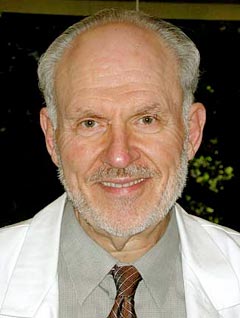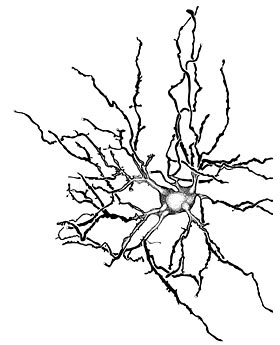Neuroanatomist Jeffery Winer has died at 63
| 11 December 2008
BERKELEY — Neurobiologist Jeffery Allan Winer, a professor of molecular and cell biology at the University of California, Berkeley, who mapped the network of nerves that allow the brain to represent and interpret sound, died Tuesday, Dec. 9, at his home in Benicia, Calif., after a brief battle with cancer. He was 63.
 Jeffery Winer (David Larue photo)
Jeffery Winer (David Larue photo)"Jeff was a classical neuroanatomist and the last of his breed," said David Larue, a UC Berkeley research specialist who worked with Winer since 1981. Trained in a 135-year-old technique, Golgi staining, that darkly stains only 1 percent of a population of neurons, Winer employed this method early in his career to study the shape of these isolated neurons "like individual trees without the confusion of the surrounding forest," Larue said.
"He was really the pinnacle of that tradition of Ramon y Cajal, the Spanish neuroanatomist who drew every axon and dendrite in the nervous system," said Winer's colleague Christoph Schreiner, a UC San Francisco professor of otolaryngology and head graduate advisor of the UCSF/UC Berkeley bioengineering group. "Jeff laid out the structure of the central auditory cortex from the ground up, detailing every synapse and neurotransmitter site on each cell, yet creating a large, overarching picture that is the most complete in existence."
Such detailed and painstaking work is needed so that physiologists can make sense of the measurements they make in the brain, Schreiner said.
"Anybody who wants to understand the auditory system cannot bypass his work; he has left a guidebook for physiologists like myself, a long-lasting and profound contribution," Schreiner said.
Winer was admired for his detailed and meticulous drawings of cellular organization in the auditory system. "The biggest fear I have is, 'Who is going to continue this fundamental work?'" Schreiner said.
 Winer's meticulous drawing of a thalamic relay neuron
from the medial geniculate body (auditory thalamus) of the cat, showing the large cell body and many dendrites that synapse with other brain cells. The cell is half a millimeter across. (Jeffery Winer/UC Berkeley-2004)
Winer's meticulous drawing of a thalamic relay neuron
from the medial geniculate body (auditory thalamus) of the cat, showing the large cell body and many dendrites that synapse with other brain cells. The cell is half a millimeter across. (Jeffery Winer/UC Berkeley-2004)"The first signal reaching the thalamus is inhibitory, as if to quiet the auditorium for the incoming sound to fill," he said. This is unique to the sense of hearing and probably arose as a way to gauge more accurately the timing of a sound and quickly alert the body's fight or flight system in case the sound heralds danger.
The National Institutes of Health honored Winer in 1993 by naming him a Claude D. Pepper Neuroscience Investigator, which came with seven years guaranteed funding from the National Institute on Deafness and Other Communication Disorders.
Winer was known for his generosity as a mentor to students, and was lauded two years ago by UC Berkeley Chancellor Robert Birgeneau as one of the campus's "everyday heroes," that is, a staff or faculty member who has made an extraordinary effort to help an undergraduate, either academically or personally.
One student praised Winer, in recommending him for the honor, as "hands down the best professor I have had at Berkeley. His 'scary' tactics and gruff demeanor mask his gentle heart and witty humor. More so, his love for the human brain has inspired many in my class to study long, arduous hours."
"He was more accessible than most faculty - he loved the pedagogic role, and his openness to students made him quite popular," Larue said. "He wrote more letters of recommendation in a month than many others would be asked to write in a year, not just for students, but for colleagues applying for jobs and faculty advancement."
Born Nov. 16, 1945, in Minneapolis, Minn., Winer moved with his family to Phoenix, Ariz., where he attended middle and high school. He earned a B.A. in psychology from the University of Arizona in Tucson in 1967 and received his Ph.D. in physiological psychology from the University of Tennessee in Knoxville in 1974.
After post-doctoral studies with Irving Diamond at Duke University (1974-1977) and Kent Morest at the University of Connecticut in Farmington (1977-79), he joined the UC Berkeley Department of Anatomy and Physiology in 1979. He switched to the newly created Department of Molecular and Cell Biology in 1986 when his old department was eliminated in a reorganization of biology teaching and research on campus. During his career, he coauthored more than 70 papers and delivered more than 25 guest lectures. He and Schreiner recently edited a major review text on the inferior colliculus of the brain, and a companion volume on the auditory cortex is currently under way.
Winer was a member of The Society for Neuroscience, American Association of Anatomists, International Brain Research Organization, International Society for Neuroethology, New York Academy of Sciences, Cajal Club, and Association for Research in Otolaryngology.
Winer was known for his passions, dividing his time between the laboratory, books and music. One whole wall of his home in Benicia was dedicated to books by and about Shakespeare, Schreiner said. He also amassed more than 7,000 classical CDs and had a high-end sound system.
"Jeff was one of the few truly well-rounded intellectuals I have known at Berkeley," said Geoffrey Owen, UC Berkeley professor emeritus of molecular and cell biology and former dean of the biological sciences in the College of Letters and Science. "His interests were unusually diverse and he had an encyclopedic knowledge of everything from Russian military history and baseball statistics to the music of any composer you cared to name, and seemingly all of English literature. He was remarkable."
Winer is survived by his mother, Eileen Winer, 94; sister, Jane Winer; and his sister's partner, Carol Galbraith, of Columbia, Md.
A memorial service is planned for late January.

